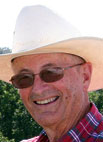
A pair of registered heifers started the Boursheski family on the road to breeding Angus cattle
Kent and Erin Boursheski live by a different philosophy than many other cattle farmers. On the Boursheski farm, there are never too many bulls. The Pierce City, Mo., couple specializes in producing, marketing and selling Angus bulls. No matter how many they raise – they have no trouble selling them all.
The Boursheski’s journey into registered Angus cattle started more than 20 years ago, when their son, Adam, wanted to show cattle. The Boursheskis purchased two registered Angus heifers for Adam, setting the foundation for a large Angus herd.
Before Kent and Erin could blink an eye, their other two children, Drew and Sara, wanted to get into the show ring.
“It was something we could do as a family,” Erin explained. “And then, we would keep those calves we had bought and they became part of our herd. It was a slow process.”
Over time their herd grew exponentially, due to Kent’s affinity for heifer calves.
“I could sell bulls, but I could never sell heifers. For some reason it was just hard – because I would grow attached to them (heifers),” Kent said with a chuckle. “So we kept heifers, kept heifers and kept heifers and now we have way too many.”
The couple now manages 90 momma cows on their 111-acre farm. Their cattle operation consists of 75 percent registered Angus cattle and 25 percent grade cattle. All the cows at Boursheski Farms are AI’d and regulated through estrus synchronization.
Kent and Erin utilize AI to improve the quality of all their cattle. Their diligent selection of bulls has proved successful. “The area vet said he had never seen such a change in somebody’s herd as ours in the last 25 years,” Kent commented.
The Boursheskis choose semen from several bulls each year to use on their herd.
“We kind of go with what’s popular. ABS’s best sires and also GENEX’s best sires,” Kent said. The couple has found it is easier to market bull calves that are out of nationally-known Angus bulls. “We buy the best semen out there and so our customers are getting top quality calves,” Kent said.
In addition, using semen from numerous bulls each year gives Boursheski Farms’ customers a diversified selection of future herd sires. “We try to keep a variety from different sires,” Erin said.
Though they would like to keep their bull calves and sell them at 18-months of age, due to demand, the Boursheskis part with their bull calves when they are yearlings.
“We just can’t keep bulls long enough,” Kent said.
Kent and Erin believe their location helps them tremendously. Their farm sits right next to Highway 60 in Barry County. A sign tacked to a fence touting, “Boursheski Farms: AI Bulls for Sale” draws in passing farmers. “We have free advertisement here. Customers just pull in,” Kent commented.
For the last seven years, Boursheski Farms has selected its top bulls to display and sell at Farmfest in Springfield, Mo. “Out of 90 cows, we will only pick out the very, very best bulls,” Kent said. The Boursheskis sell four bulls each year at Farmfest, they sell around a dozen off their farm and the rest of the bulls they take to Joplin Regional Stockyards. They also sell their heifers off the farm or at Joplin Regional Stockyards.
The Boursheskis pride themselves in preparing future herd sires for their customers. Once the bull calves are weaned, the Boursheskis halter break all of them. “We make sure they are very docile and make sure they are all broke to lead,” Erin explained.
Now that their children are adults and no longer on the farm, the Boursheskis hire local FFA youth to help them. In particular, the Boursheskis rely on the teenagers to wash, dry, comb and work with the bull calves. Kent and Erin appreciate the assistance and the youth are grateful for the opportunity to work on a farm.
The Boursheskis value the guidance they have received from members of the Missouri Angus Association and the Barry County Extension Center. Kent and Erin find the information available through those organizations critical to their success. “It is really important to use those organizations – it is free knowledge and information,” Kent said.
The couple used information gained from a rotational grazing class to overhaul Boursheski Farms’ pastures. Kent and Erin divided their 15 to 20 acre tracts into smaller 2- to 3-acre paddocks. They have found the strip grazing provides their cattle plenty of nutrients and reduces the amount of grain and hay they feed.
Though Kent and Erin put in full days farming, they also make it a priority to give back to the community. They served three terms on the Barry County Extension Council, dedicate time to their church and volunteer at area charities.






